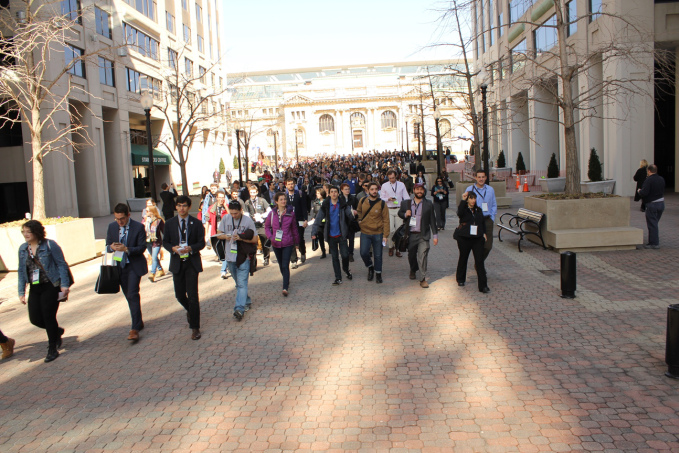
Though J Street U and Hillel moved closer to working together in June, progress is still slow.
At the meeting, which took place on June 10, J Street U made several requests of Hillel, and Hillel asked for time before committing to any of them.
The meeting came after Hillel International CEO Eric Fingerhut’s decision to withdraw from his prior commitment to speak at the 5th annual J Street U conference. After his decision caused backlash from J Street U, he wrote an email to its leaders offering conversation in the spirit of reconciliation, writing that Hillel and J Street U “clearly have work to do in the Jewish community at large to be one people that respects, honors and celebrates its diversity rather than fearing it.”
On March 23 — the second day of the conference — J Street U demanded, in person, an on-the-record meeting with Hillel International.
Conference attendees marched down to the Hillel International headquarters in D.C. and asked for Hillel’s support of J Street U activists. Benjy Cannon, the national student president of J Street U and a student at the University of Maryland, told New Voices after the march that the organization “wanted to figure out an active way to move the conversation to what constrained him to withdraw to begin with.”
A few hours after the march, Fingerhut agreed to a meeting. The meeting ultimately took place on June 10.
Catie Stewart, a junior at Brandeis and the northeast representative on the student board of J Street U, said J Street U had hoped for immediate results from the meeting.
“The goal was to clarify Fingerhut’s decision and how to move forward with Hillel,” she said. “We wanted to come away from it with some kind of agreement.”
Hillel did not respond to requests for comment.
J Street U and Hillel have had differences in the past. Hillel member Daniel Mael, Brandeis ’15, said he thinks that J Street U “selects to divide and polarize the Jewish community on many campuses across the country.”
“J Street U’s sense of entitlement and willingness to ostracize many quality Jewish leaders is ultimately in line with the misguided ideology of the organization as a whole,” said Mael, a cofounder of Safe Hillel, an organization that aims to keep Hillel pro-Israel.
The meeting was meant to address these biases against one another and figure out a way for the organizations to work together.
“Hillel’s board members really care about Jewish students,” said Lex Rofes, Brown University ’13, a former Hillel board member and J Street U supporter.
“At the same time, they don’t know J Street U.”
Ultimately, Rofes said, J Street U didn’t get what it wanted out of the meeting.
“We are at a place where there is a lack of trust between board members and students,” he added.
Though Hillel board members listened to J Street U’s requests — which included a meeting with Hillel donors and having Fingerhut speak at another J Street conference — they asked for more time before saying yes to any of them.
Holly Bicerano, Boston University ’15 and a former member of Open Hillel, said this was likely because of the precarious political position of Hillel leaders.
“Hillel leaders are stuck in the middle, trying to be inclusive of liberal progressive voices while not alienating right-wing donors and groups that are opposed to J Street,” Bicerano said.
Stewart said J Street U was disappointed with the outcome of the meeting.
“We really wanted to move past the conference,” Stewart said. “It was disappointing not to get an answer.”
Their hope now is that Hillel leaders get back to J Street U with a way to move forward.
“I’m happy this meeting happened, but it has to be the beginning,” Rofes said.
Nicole Zelniker is a student at Guilford College.

